Social Media Influencers: Avoiding Liability
- Last Updated: June 12th, 2025

Attorney Jessie Paluch, founder of TruLaw, has over 25 years of experience as a personal injury and mass tort attorney, and previously worked as an international tax attorney at Deloitte. Jessie collaborates with attorneys nationwide — enabling her to share reliable, up-to-date legal information with our readers.
Legally Reviewed
This article has been written and reviewed for legal accuracy and clarity by the team of writers and legal experts at TruLawsuit Info and is as accurate as possible. This content should not be taken as legal advice from an attorney. If you would like to learn more about our owner and experienced injury lawyer, Jessie Paluch, you can do so here.
Fact-Checked
TruLawsuit Info does everything possible to make sure the information in this article is up to date and accurate. If you need specific legal advice about your case, contact our team by using the chat on the bottom of this page. This article should not be taken as advice from an attorney.
Key Takeaways:
- Influencers wield significant power in digital marketing, necessitating a balance between creative expression and legal compliance.
- Understanding regulations like FTC guidelines and IP rights is essential for avoiding liability.
- Maintaining transparency and authenticity is key in building and preserving audience trust.
Overview of Social Media Influencers
On this page, we’ll discuss the liability of social media influencers, importance of social media influencers disclosing paid advertisements, potential legal consequences for social media influencers, and much more.
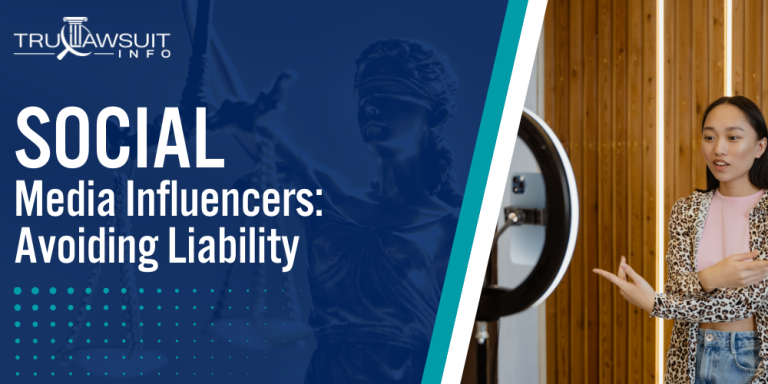
Intro to Social Media Influencers and Liability
Types of social media influencer audiences include:
- Mega-Influencers: These are often traditional celebrities or internet personalities with over a million followers.
- Macro-Influencers: With followers between 100,000 and a million, these influencers have large audiences and often high engagement rates.
- Micro-Influencers: have between 1,000 and 100,000 followers and are known for their focused content and highly engaged audiences.
- Nano-Influencers: Although they have fewer than 1,000 followers, they boast high engagement rates and are seen as trustworthy by their tight-knit communities.
If you or a loved one has been affected by a social media influencer, seeking professional legal guidance is essential.
Contact TruLawsuit Info using the chat on this page to receive an instant case evaluation and protect your legal rights as an influencer.
Table of Contents
Understanding FTC Endorsement Guidelines
The Federal Trade Commission (FTC) has set guidelines that govern endorsements to ensure transparency and fairness in social media advertising.
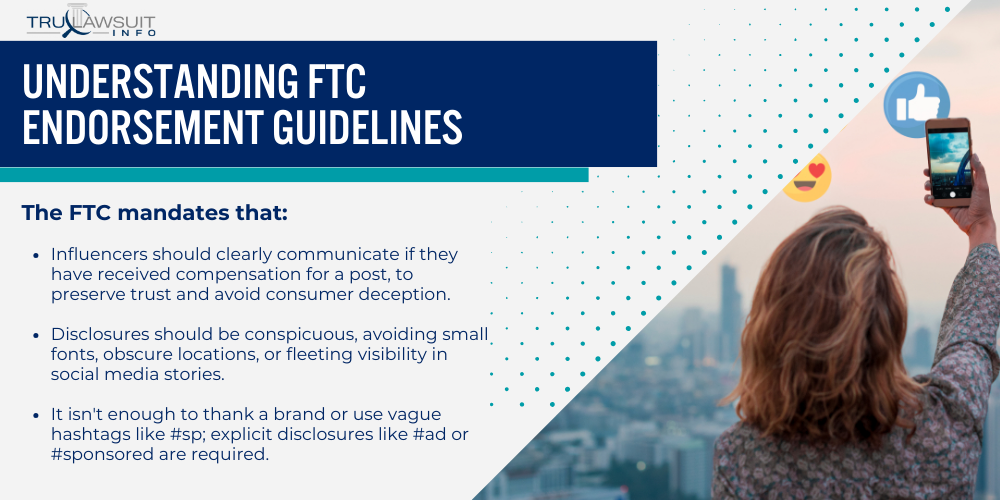
Disclosing Material Connections with Brands
Material connections between influencers and brands, whether through free products or monetary compensation, need to be disclosed to the audience.
The FTC mandates that:
- Influencers should communicate if they have received compensation for a post to preserve trust and avoid consumer deception.
- Disclosures should be conspicuous, avoiding small fonts, obscure locations, or fleeting visibility in social media stories.
- It isn’t enough to thank a brand or use vague hashtags like #sp; explicit disclosures like #ad or #sponsored are required.
- Every social media post that promotes goods or services with an incentive from a brand must contain a clear and prominent disclaimer regarding the relationship.
Avoiding Deceptive or Misleading Claims
Advertising guidelines are stringent, requiring that all claims be truthful and not misleading.
Influencers must ensure that their communications align with these standards, preventing any misinterpretations.
To protect consumers from being misled, the FTC emphasizes honesty in social media endorsements:
- Claims in sponsored posts should be factual and capable of being substantiated — influencers should verify the information before sharing.
- Credibility hinges on the honesty of product or service reviews, so influencers should only endorse products they have used or experienced.
- Deceptive practices, such as using filters that dramatically alter the effect of the product being endorsed, are discouraged.
- Transparency is paramount. If that is not the case, a micro-influencer should not imply that a sponsored product is part of their normal lifestyle.
Exploring Intellectual Property Rights
In the social media sphere, influencers are often challenged by balancing creative freedom with the legal boundaries of intellectual property (IP) rights.
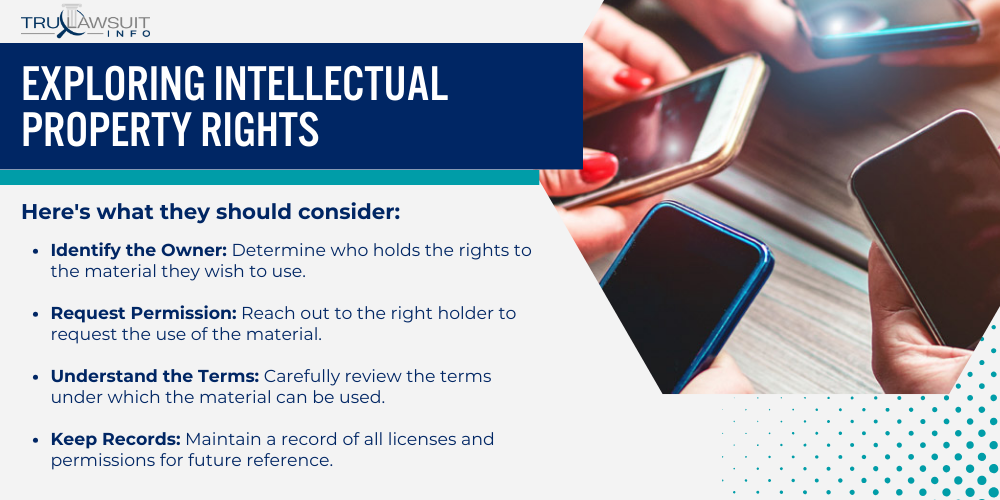
Obtaining Proper Licenses and Permissions
When influencers create content, it’s essential to secure the necessary licenses and permissions.
Quality content often involves the use of copyrighted materials such as music, images, or video clips.
Here’s what they should consider:
- Identify the Owner: Determine who holds the rights to the material they wish to use.
- Request Permission: Reach out to the right holder to request the use of the material.
- Understand the Terms: Carefully review the terms under which the material can be used.
- Keep Records: Maintain a record of all licenses and permissions for future reference.
Respecting Copyright and Trademark Laws
Respecting copyright and trademark laws is critical for influencers to avoid legal pitfalls and maintain their high-quality content’s integrity.
They should remember:
- When using someone else’s work, proper attribution is often required.
- Understand how “fair use” may apply to their utilization of copyrighted materials.
- Stay away from unauthorized use that can lead to copyright and trademark infringement.
- Strive to create content that is original or transforms the original work significantly.
Managing Contractual Obligations
In the evolving social media landscape, influencers must be adept at managing the contractual agreements that govern their collaborations and endorsements.
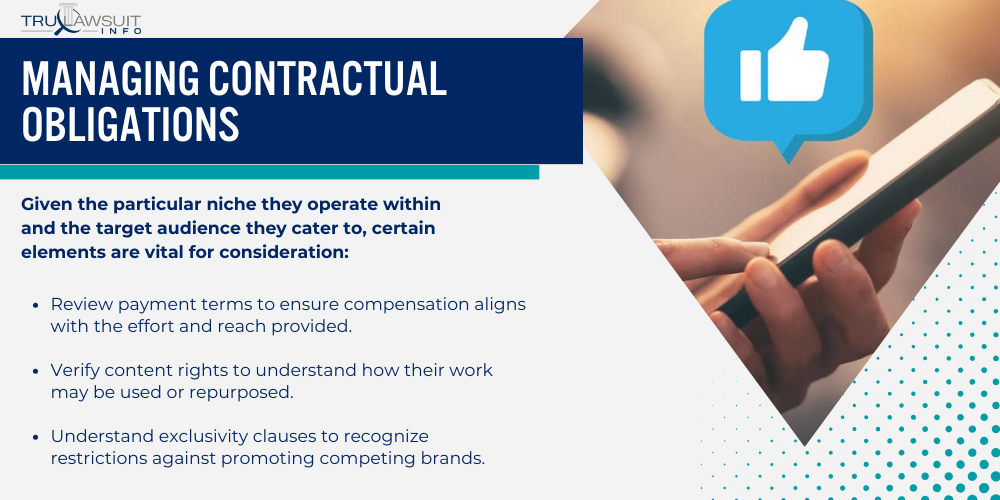
Carefully Reviewing and Negotiating Contracts
Social media influencers often engage in contractual agreements that define the terms of their partnerships.
Given the particular niche they operate within and the target audience they cater to, certain elements are vital for consideration:
- Review payment terms to ensure compensation aligns with the effort and reach provided.
- Verify content rights to understand how their work may be used or repurposed.
- Understand exclusivity clauses to recognize restrictions against promoting competing brands.
- Scrutinize morality clauses which could affect partnerships in case of controversial behavior.
Fulfilling Deliverables and Meeting Deadlines
Upon finalizing a contract, influencers are tasked with meeting the stipulated deliverables and deadlines.
This requires a careful balance of creativity and precision:
- Develop content calendars that align with campaign timelines.
- Produce content that resonates with both the brand’s ethos and the influencer’s personal brand.
- Communicate with brand partners to report progress and get timely feedback.
- Ensure that sponsored content maintains authenticity to keep the trust of the audience.
Protecting Personal Privacy and Reputation
In the digital age, social media influencers face the challenge of sharing content with their audience while also safeguarding their privacy and reputation.

The balance between accessibility and personal boundaries is delicate, and managing public perception requires a careful marketing strategy.
Maintaining Appropriate Boundaries with Followers
Bolded keywords: engage, boundaries, privacy management, personal character
To navigate the public’s attention effectively, influencers must actively engage with their followers without compromising privacy.
Key practices include:
- Setting clear limits on the type of personal information shared online.
- Employing privacy settings on social media platforms to control audience reach.
- Educating followers about respect for personal boundaries.
- Creating content policies that define acceptable levels of personal sharing.
These strategies help to shape the influencer’s persona while protecting their personal character and safeguarding sensitive information.
Responding to Negative Feedback and Criticism
Bolded keywords: reputation management, crisis management, feedback, criticism
No one is immune to criticism, and influencers must often deal with negative feedback.
Effective reputation management often dictates success in overcoming such hurdles.
Considerations when responding to criticism include:
- Evaluating the feedback for validity before replying.
- Choosing to address legitimate concerns publicly to demonstrate accountability.
- Developing a plan for crisis management if the reputation is at risk.
- Avoiding defensive reactions which can exacerbate the situation.
Complying with Platform-Specific Policies
Social media influencers have the responsibility to align their content with the policies established by the platforms they use.
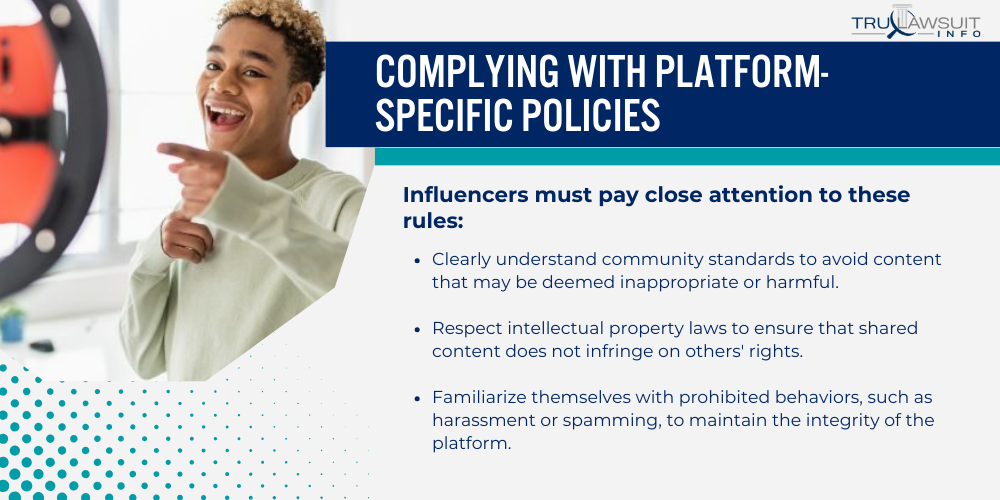
These rules ensure a safe and fair environment for all users.
Adhering to Community Guidelines and Terms of Service
Social media platforms each have their own set of guidelines.
Influencers must pay close attention to these rules:
- Clearly understand community standards to avoid content that may be deemed inappropriate or harmful.
- Respect intellectual property laws to ensure that shared content does not infringe on others’ rights.
- Familiarize themselves with prohibited behaviors, such as harassment or spamming, to maintain the integrity of the platform.
- Recognize platform-specific advertising rules to disclose partnerships and sponsored content transparently.
Staying Informed of Policy Updates and Changes
Social platforms are dynamic, with regular updates to their policies.
Influencers staying updated is essential:
- Regularly check for updates in the policy or announcement sections of the social channels they use.
- Subscribe to official communications or newsletters that announce changes and updates.
- Participate in webinars or online training sessions offered by platforms to grasp new guidelines fully.
- Use official platform resources and help centers to find clarifications and explanations of rules.
- Seeking Professional Legal AdviceWhen social media influencers expand their reach, they often encounter legal considerations.To maintain integrity and legality in their operations, they should seek informed legal counsel.
Consulting with Attorneys Specializing in Influencer Law
Social media influencers are part of a dynamic industry with specific legal challenges.
They should consult legal professionals who understand the nuances of this field.
Here’s why they should consult attorneys specializing in influencer law:
- Legal experts are well-versed in the unique aspects of digital content creation.
- Attorneys can offer guidance on contract negotiations with brands and other partners.
- Influencer law specialists keep abreast of changes in advertising and disclosure regulations.
- Lawyers in this niche can advise on intellectual property rights pertaining to online content.
Proactively Addressing Potential Legal Issues
Being proactive about legal matters can save social media influencers from future headaches.
Below are key areas in which they should be vigilant:
- Disclosure requirements: Influencers must comply with regulations regarding the promotion of products or services.
- Copyright and trademark laws: They should ensure that the content they produce does not infringe on others’ intellectual property.
- Contractual agreements: Influencers should have clear, fair agreements when collaborating with brands or agencies.
- Defamation risks: It’s essential to understand what constitutes defamation to avoid legal pitfalls related to content posts.
Maintaining Transparency and Authenticity
Transparency and authenticity are fundamental in an influencer’s relationship with their audience and collaborations with brands.
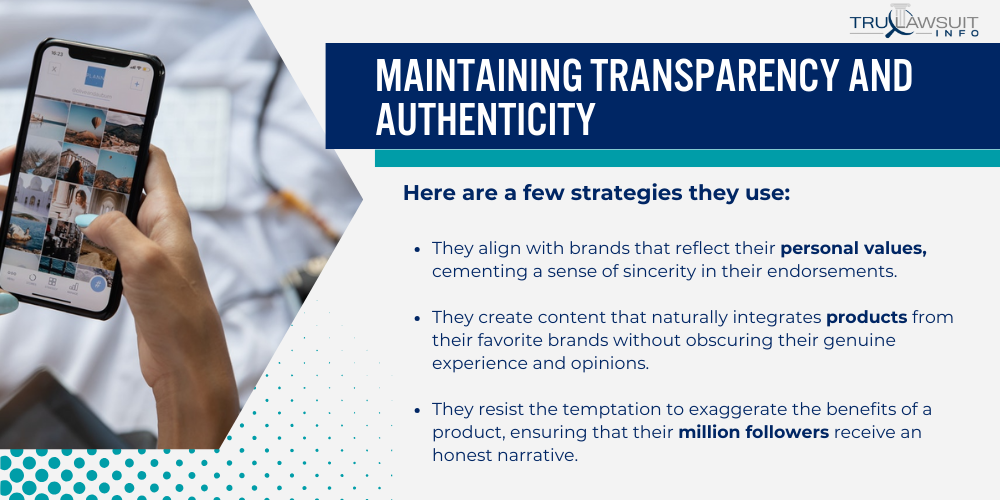
This delicate balance is key to ensuring continued engagement and trust.
Being Honest and Genuine in Content Creation
Influencers face the challenge of producing content that resonates with their followers while also appealing to brand partnerships.
Here are a few strategies they use:
- They align with brands that reflect their personal values, cementing a sense of sincerity in their endorsements.
- They create content that naturally integrates products from their favorite brands without obscuring their genuine experience and opinions.
- They resist the temptation to exaggerate the benefits of a product, ensuring that their million followers receive an honest narrative.
- They openly share their creative process, providing insights into their content’s authenticity, which helps in maintaining a loyal audience.
Fostering Trust and Credibility with Audiences
For top influencers, building trust is a painstaking process that can be easily undermined without transparency.
Important steps include:
- Being consistent in voice and messaging to solidify their brand.
- Communicating openly about sponsorships and endorsements so as not to mislead their audience.
- Engage with their community, addressing questions and feedback to show that they value their audience’s trust.
- Using transparent authenticity strategies, which involves disclosing brand relationships and keeping promotional content balanced with non-sponsored posts.
Staying Informed of Industry Developments
In the dynamic arena of influencer marketing, staying current with evolving standards and practices is essential for success.
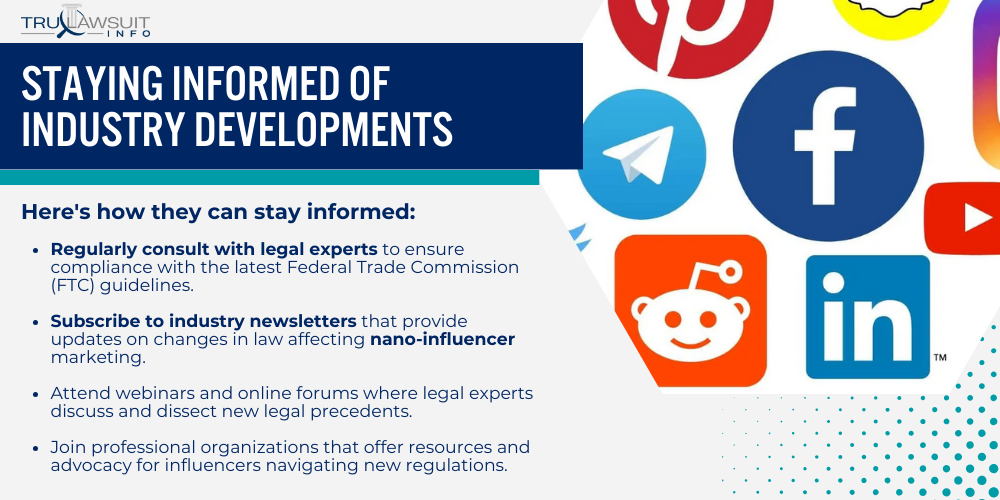
This pertinence is magnified for those deeply involved in the industry, whether they are content creators or part of an influencer marketing hub.
Keeping Up with Evolving Legal and Regulatory Landscapes
Influencers and brands alike must be vigilant about changes in legal and regulatory frameworks that govern endorsements and advertising.
Here’s how they can stay informed:
- Regularly consult with legal experts to ensure compliance with the latest Federal Trade Commission (FTC) guidelines.
- Subscribe to industry newsletters that provide updates on changes in law affecting nano-influencer marketing.
- Attend webinars and online forums where legal experts discuss and dissect new legal precedents.
- Join professional organizations that offer resources and advocacy for influencers navigating new regulations.
Adapting to Changes in Influencer Marketing Practices
Influencer marketing is an ever-evolving field, with new practices constantly emerging as trends shift.
Entities within this space must adapt to stay relevant:
- Keep tabs on the success stories of peers; a viral video or a content creator’s strategic collaboration can signal emerging trends.
- Monitor the success of influencers who launch their own merchandise lines or offer services like personal training. Their approaches to marketing and engagement can serve as a model.
- Analyze the changing preferences of the audience, such as the pivot from highly polished content to more genuine makeup tutorials.
- Note the growth and engagement strategies of influencers who manage to increase their YouTube subscribers significantly.
Frequently Asked Questions
-
How do social media influencers affect consumer behavior?
Social media influencers often sway consumer decisions through trust and reliability.
They create content that showcases products or services, influencing their followers’ purchasing habits by establishing a sense of authenticity.
-
What strategies do successful social media influencers use to engage their audience?
Successful social media influencers prioritize engaging content that resonates with their audience.
They frequently interact with their followers through comments and messages, creating a two-way dialogue that fosters community and loyalty.
-
How has the rise of social media influencers changed marketing campaigns?
The rise of social media influencers has led to an integrative approach in marketing campaigns.
Brands now often collaborate with influencers to target specific demographics more organically and effectively than traditional advertising.
-
What are the potential risks of partnering with social media influencers?
Aligning with social media influencers can sometimes lead to misaligned branding if the influencer’s values don’t match the company’s.
Additionally, influencers might face scandals or controversies, which can adversely affect the partnered brand’s reputation.
-
How do social media influencers leverage various platforms to maximize their reach?
Influencers utilize a mix of platforms by tailoring content to each platform’s unique audience and format.
They employ analytics tools to understand performance and optimize their social media posts for greater visibility and engagement.
-
What is the process of becoming a recognized social media influencer?
The process usually begins with identifying a niche and consistently creating high-quality content within that space.
Prospective influencers must also invest time in networking and learning the intricacies of each social media platform’s algorithms to grow their audience.

Experienced Attorney & Legal SaaS CEO
With over 25 years of legal experience, Jessie is an Illinois lawyer, a CPA, and a mother of three. She spent the first decade of her career working as an international tax attorney at Deloitte.
In 2009, Jessie co-founded her own law firm with her husband – which has scaled to over 30 employees since its conception.
In 2016, Jessie founded TruLaw, which allows her to collaborate with attorneys and legal experts across the United States on a daily basis. This hypervaluable network of experts is what enables her to share reliable legal information with her readers!
Have A Case?
Here, at Tru Lawsuit Info, we’re committed to helping victims get the justice they deserve.
To do this, we actively work to connect them with attorneys who are experts in litigating cases similar to theirs.
Would you like our help?
Tru Lawsuit Info is a reliable source of information about issues that may affect your health and safety, such as faulty products, data breaches, and environmental hazards.
Our team of experienced writers collaborates with medical professionals, lawyers, and advocates to produce informative articles, guides, and other resources that raise awareness of these topics.
Our thorough research provides consumers with access to reliable information and updates on lawsuits happening around the country. We also can connect consumers with attorneys if they need assistance.
Camp Lejeune's water contamination issue spanned several decades starting in the 1950s. Exposure to these chemicals has been linked to various serious health issues, including cancer, organ diseases, and death.
Research is increasingly suggesting a link between the use of Tylenol during pregnancy and the development of neurodevelopmental disorders, such as autism and ADHD, in infants.
Legal action is being taken against manufacturers of Aqueous Film-Forming Foam (AFFF), a chemical used in fighting fires. The plaintiffs allege that exposure to the foam caused health issues such as cancer, organ damage, and birth and fertility issues.
Have A Case?
Here, at Tru Lawsuit Info, we’re committed to helping victims get the justice they deserve.
To do this, we actively work to connect them with attorneys who are experts in litigating cases similar to theirs.
Would you like our help?







